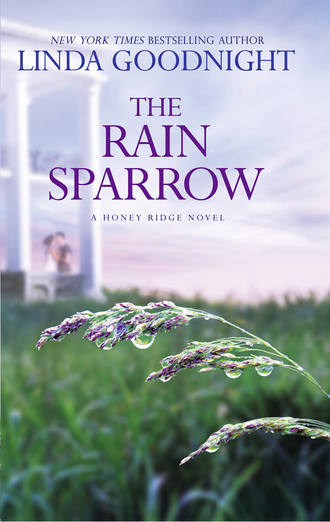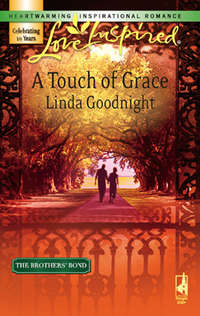
Полная версия
The Rain Sparrow
“Hayden Winters.”
“Nice to meet you, Hayden.” She held up a canister of coffee beans. “Bold?”
“I can be.”
She laughed, shocked to think this handsome man might actually be flirting a little. Even if she wasn’t. “Bold it is.”
As she’d predicted, the storm noise covered the grinding sound and in fewer than ten minutes, the silver pot’s lever was pressed and the coffee was poured. The dark, bold aroma filled the kitchen, a pleasing warmth against the rain-induced chill.
Hayden Winters offered her the first cup, a courteous gesture that made her like him, and then sipped his. “You know your way around a bold roast.”
“Former Starbucks barista who loves coffee.”
“A kindred spirit. I live on the stuff, especially when I’m working, which I should be doing.”
She didn’t want him to leave. Not because he was hot—which he was—but because she didn’t want to be alone in the storm, and no one else was up. “You work at night?”
“Stormy nights are my favorite.”
Which, in her book, meant he was a little off center. “What do you do?”
He studied her for a moment and, with his expression a peculiar mix of amusement and malevolence, said quietly, matter-of-factly, “I kill people.”
3
Hayden didn’t know what possessed him to say such a thing when this pleasant woman was already a nervous wreck and had saved his night with a terrific cup of coffee, but he’d given his standard glib answer when asked about his line of work. The press seemed to love it. Carrie, not so much.
She squeaked again. Cute. Mouse-like. Her eyes widened to two huge, espresso-colored circles. He had the random thought that those soft eyes could melt concrete.
Hayden set the cup aside and took a step toward her. “Metaphorically speaking.”
She took a step back, arms tight over her chest. “Excuse me?”
“I’m a writer. Thrillers.”
“Oh.” The big doe eyes blinked. “You’re a writer. You don’t kill people literally.”
“Only in the pages of my books.”
She put a hand to her heart and blew out a breath. “Thank goodness. I thought for a minute...stormy night, thunder, lightning, murder.” She arched her back in a body shrug.
“Bad habit of mine.”
“Murdering people?”
“That, too.” He smiled. She was pretty cute.
“Wait a minute.” She held up a finger. “What did you say your name was again?”
“Hayden Winters.”
“Well, do I ever feel stupid.” Fists on hips, she shook her head in self-disgust. “Hayden Winters. The novelist. We have all your books in the library—very popular, too, I might add—but apparently my brain did not register an actual bestselling author here in Honey Ridge.”
He braced for it, fully expecting her to fawn over him and make all kinds of gushy noises before an onslaught of tedious questions about the easy way to get published and why he’d chosen to write thrillers. He hadn’t. They’d chosen him.
Why couldn’t he have a conversation with a woman without things getting awkward?
“Now that I know you’re not going to kill me,” she went on, “I’ll share a secret with you. I know where Julia keeps the cookies.” She clinked her cup on the countertop, stood on tiptoe and opened an overhead cupboard. “Oreos or pecan sandies?”
The back side of her intrigued him, threw him off. Everything about her threw him off. She wasn’t impressed by Hayden Winters, and he didn’t know if that bothered or pleased him.
He let his eyes roam, taking her in, a writer’s habit of observing nuances, gestures. And yet something essentially male stirred, just a bit, as he watched Carrie Riley stretch up high for the cookies. He should have offered to reach them, but he’d rather watch her.
She wasn’t tall—average height, maybe, with ample curves, maybe a little extra in the hips that he found...comforting. Her hair was the color of roasted pecans, short and shoved behind her ears and messy on top. Side bangs fell across her forehead. She looked good sleep-mussed, her classic pajamas in an almost see-through shade of pink cupcakes.
And her feet were pretty.
He must be asleep and dreaming because he didn’t have a foot fetish. Never noticed women’s feet unless they were in shoes sky-high and strappy at the end of very long legs. But Carrie’s bare feet were perfectly shaped, feminine and smooth, and her toes polished a shiny pearl. Around her left ankle was a delicate silver chain he found particularly intriguing.
She turned her head and looked over one shoulder at him. “Which kind?”
He snapped his eyes to hers. “You choose.”
She handed down the sandies and then reached back for the Oreos, grinning. “Who says we can’t have both?”
Plastic crinkled as she ripped open the packages and offered him first dibs. He took his mind off the interesting little ankle bracelet to help himself to an Oreo.
“Julia prefers to bake from scratch. This is her emergency stash.”
“Is this an emergency?”
“In a storm of this proportion? You bet it is.” She crunched down on a sugary sandie, scattering crumbs.
He saluted her with the Oreo and thought how pleasant and comfortable this unexpected late-night encounter had become. She had no idea she’d saved him from a bout of melancholy after the conversation with his mother.
He was about to pry into her life, a natural result of his writer’s curiosity, when a sound from outside caught his ear.
He tilted his head. “Did you hear something?”
Carrie’s espresso eyes got bigger. “No. Did you?”
“A clatter. On the porch. As if a chair fell over.”
Thunder rolled, and rain gushed against the house as loud as Niagara Falls. “How can you hear anything over the storm?”
He shrugged. “Probably nothing.”
“It’s your murderous writer’s brain.”
She wasn’t wrong about that, but he walked to the window anyway and peered out.
“Black as the heart of a coal mine.” He started to turn back to his bold coffee and chocolate cookie when a shadowy bulk caught his eye.
“What is—?” He tensed, leaned in, squinted. “Turn the light off.”
“What? What do you see?”
“Turn the light off so I can be certain.”
“You’re making me nervous.”
“It’s probably some poor animal trying to get out of the storm.”
“A mountain lion. Or a bear.”
He smirked at her. “You have a vivid imagination.”
“From the mouth of Hayden Winters.” She clicked off the light. “Don’t do something juvenile and try to startle me. I’ll scream and wake the whole house.”
But Hayden’s attention was focused on the dark lump against the wall of the porch. “There’s someone on the veranda.”
“No way.” She flipped the light back on. “No one would be out in this.”
“No one should be.” He strode to the entry leading out onto the veranda, flipped on the porch light and jerked the door open.
Rain and wind battered the flowers along the railing and sprayed mist against the entry. Hayden felt Carrie’s warmth close behind him, felt her shiver.
Her sharp intake of breath matched his.
“Oh, my gravy,” she whispered.
Storm or no storm, Hayden strode outside. A wind gust sprayed him with fat drops of rain, and cold prickled the skin on his arms.
A boy, drenched to the bone and shivering, huddled against the wall, a soggy bundle of plastered hair and pale skin.
“What are you doing out here?” Hayden demanded.
The kid’s teeth chattered. “I—I got lost.”
“On a night like this?”
Miserably, the boy nodded but glanced away, either lying or too chilled to hold eye contact. No kid would be out alone in a storm without good reason.
Hayden grabbed him by the arm and said, “Come inside.”
The boy came willingly, eagerly, and stood in the entry dripping water everywhere. He shivered like a wet Chihuahua.
Hayden pulled the door closed and blocked out the chilly wet air.
“We’ll need towels.” Carrie rushed away.
While she was gone, Hayden quietly assessed the young boy. He was slender built, close to skinny, with a heart-shaped face kissed by a sprinkle of brownish freckles. A Huckleberry Finn kind of kid who was trying to look anywhere except in Hayden’s eyes. There was something frighteningly familiar about the kid, so much so that Hayden softened.
In a patient voice, he said, “I’m Hayden. Who are you?”
“Brody.” He rubbed a soggy hand across his wet eyes. His rain-darkened eyelashes stuck straight out above cheeks pale as sand.
“So you got lost?”
The boy stared down at the ever-widening puddle on the floor. “Um...yeah.”
Lost didn’t feel right to Hayden. He was reasonably sure the boy was hiding something. The question was, why?
“What were you doing out in this kind of weather?” A beeping sound came from the kitchen. Hayden kept his focus on the child.
“Camping out.” Brody’s voice was soft and uncertain. “I wasn’t expecting the storm.”
Camping out. Okay, that made sense. Country boys did that kind of thing. He’d done it plenty of times.
“By yourself?”
“Yeah.”
Carrie appeared with two snow-white towels and draped one around the boy’s shoulders. “I warmed them for you in the microwave.”
That explained the beep.
“Smart.” Hayden glanced at her in appreciation.
“Thank you.” Brody shivered and huddled beneath the fluffy towel while Carrie patted at his face and soggy hair with the other. Kind. Tender. Her actions stirred something in Hayden’s chest. He couldn’t remember anyone ever drying him off.
“What’s your phone number, Brody? I’ll give your folks a call.”
“Uh, they’re, uh—” The boy fidgeted. “They’re not home.”
“No?” Suspicion, like a hairy spider, crawled over Hayden’s scalp.
Brody flashed pale blue eyes at Hayden before letting them slide away. But in that instant, Hayden saw the truth. The kid didn’t want to go home. He preferred a stormy, cold, wet night alone.
An icy feeling of déjà vu lodged in Hayden’s chest.
He’d camped out in the woods dozens of times to avoid going home.
Carrie disappeared again to make noises in the kitchen. Lightning flickered against the windows, less intense than earlier.
“You camp by yourself often?”
“I like the woods.” Brody’s quiet words were almost imperceptible.
If the kid knew the woods well enough to camp, he likely had not been lost at all.
“How old are you, Brody?”
“Eleven.”
“You live close by?” The lopsided conversation felt more like an interrogation, which Hayden supposed it was.
“In town.”
Hayden had stopped in the picturesque town of Honey Ridge, a couple of miles down the road, when he’d come through on his way to the inn. “Pretty long walk.”
“I don’t mind it.” A glint of humor showed in the blue eyes Brody flashed his way. “Except when it storms.”
“Can’t say I don’t feel the same.”
Carrie returned, carrying a steaming white cup and the bag of Oreos. “Here you go, Brody. A mug of hot cocoa should warm you up.”
Shaky hands took the offered treats. “Thanks.”
The kid gobbled a cookie in two bites. Hungry, Hayden thought, when he dispatched a second one every bit as quickly. Pondering, Hayden munched on his Oreo while the boy ate and drank.
“You’re welcome to all the cookies you want.” Carrie urged the package toward Brody.
“I should...go.” But he made no move to shed the now-damp towels or move toward the door.
Carrie put another cookie in his hand. “Drink your cocoa, and we’ll figure something out.”
The kid had nowhere to go. Hayden had already figured that out even if Carrie hadn’t. A thought danced through his head, and he latched on.
“I have a perfectly good room upstairs that I won’t be using tonight,” Hayden offered. “Why don’t you bunk there until morning?”
Brody shook his head. “I couldn’t do that.”
“Why not? I paid for the bed, but I won’t be in it. Someone might as well sleep there.”
“But—”
“He works at night, Brody.” Carrie flashed Hayden a look of gratitude. “It’ll be okay. Julia won’t mind.”
Hayden didn’t know if the innkeeper would mind or not, and he didn’t much care. The kid was cold, hungry and too exhausted to be any trouble. He was staying. If Julia wanted to charge extra on Hayden’s tab, fine.
“I’ll take my laptop into the front parlor close to the coffeemaker. The bed’s all yours.”
The boy looked relieved, hopeful. “You sure? I wouldn’t bother nothing.”
“Drink up, and let’s get you upstairs.”
Brody took a long swig and drained the cup, handed it off to Carrie. “Thank you. You make delicious cocoa.”
Carrie touched his wet hair. She was, Hayden noticed, a toucher. “You’re welcome.”
“Ready?”
The boy nodded, and Hayden led the way up the stairs, whispering, “Watch the third step. It creaks.”
With a solemn nod, Brody imitated Hayden’s path and nothing squeaked.
Inside the bright and pretty Mulberry Room, Brody stood awkward and silent while Hayden dug out a pair of drawstring sweats and a T-shirt. The air was thick and humid from the damp night and a wet boy who smelled of river and woods.
“They’ll be too big, but they’re dry.” He motioned toward the bathroom. “In there. You can grab a hot shower if you want to.”
“I’m pretty tired.”
“I bet you are. Change, then, while I gather my work gear.”
Hayden needed less than a minute to organize his laptop, charger and notebook. For good measure, he added the extra blanket from the closet and pocketed his wallet. Sometimes a kid did things out of desperation.
Brody reappeared, a waif in oversize clothes, the gray sweats rolled up at the ankle and the shirt hanging below his hips. He’d scrubbed at his hair with a towel and it stuck out like porcupine quills. He held the wet clothes in his hands. “Where should I put these?”
“I’ll take them. They’ll have a dryer.” Carrie would know, and he hoped she hadn’t gone to bed. She was apparently a friend of the innkeeper and knew her way around the inn.
Hayden added the jeans and shirt to the items he’d take downstairs, then flipped back the mulberry-print comforter and gestured. The boy climbed in, his cold feet brushing Hayden’s hand. Tucking in a kid brought an odd sensation, and he had a sudden gray-edged memory of his father, the scent and soot of the mines imprinted in his pores, snugging a blanket beneath Hayden’s chin.
Brody’s pale fingers gripped the edge of the cover. His eyes drooped and he sighed, a pitiful sound of relief and exhaustion.
Hayden stepped back to leave.
“Mister?”
“Yes?”
“Thanks.” Brody’s lips barely moved as his eyelids fluttered shut.
Full of a pity he didn’t want to feel, Hayden waited less than a minute before the skinny chest rose and fell in rhythmic sleep. Softly he murmured, “Good night, Brody.” What was left of it.
He clicked the switch and sent the room into darkness lit only by the flicker of leftover lightning. So much for writing during the storm. The best part was nearly gone.
Skirting the third step, he made his way back to the kitchen, where Carrie cleaned up the evidence of the night’s activities.
When he entered the room, she paused, closed Oreo package in hand, to nod at Brody’s wet garments. “Let me have those.”
Hayden handed over the soggy clothes and followed Carrie down a short hall behind the kitchen to a laundry room.
“That was nice of you,” she said.
“What else was I going to do? Toss the kid back out in the storm?”
“I could have woke up Julia and gotten the key to a vacant room.”
He shrugged. “No need. I’m up anyway.”
“Right.” She tossed the clothes into the dryer, added a softener sheet, clicked the door shut and hit a button that set the tumbler into humming motion and the warm humid smell of peaches swirling about the space. “So you can kill people.”
“Uh-huh.” Starting with the parents of a certain half-drowned boy, he thought with grim satisfaction.
Carrie headed back to the kitchen to finish the cleanup. A neat freak with the neurotic need to be cleaner than his boyhood, Hayden joined in.
“I know that boy,” Carrie said as she sponged down the countertop. “He comes in the library nearly every day after school for our tutoring program.”
“Why didn’t you say something?”
She shrugged. “He probably doesn’t know who I am. Kids don’t notice librarians.”
He did. “What do you know about him?”
“He hangs out and plays on the computers, reads some but rarely checks out a book. He likes mysteries and adventure.” She flashed the charming dimple. “Librarians always notice reading preference. He doesn’t say much or bother anyone, but he generally stays awhile, as if he has no place else to be. We get our share of those at the library.”
“Do you know his parents?”
“He lives with his father. No mother in the picture. Brody’s one of the street kids around Honey Ridge. I don’t believe for one minute that he was lost.”
Hayden filled a coffee carafe and started another pot. “That was my take, as well. His father isn’t out of town, either.”
“Why would he lie about a thing like that? If his dad is at home, why didn’t he let us call him?”
There were plenty of reasons, and Hayden, unfortunately, knew too many of them.
* * *
Long after Carrie trudged up the stairs in hopes of a few hours’ sleep, Hayden contemplated the night’s events and stared at a blank word processor. Fueled by the cookies and strong coffee, his mind whirled, though not in the direction he’d hoped. Carrie, Brody and Dora Lee wouldn’t leave him alone.
He stretched, rolled his neck and roamed the parlor.
Finally, frustrated by the lack of progress, he grabbed the blanket and a throw pillow and flopped down on a curved, skinny Victorian sofa clearly not intended for napping. Especially by a man with long legs.
After fifteen minutes of misery, he rolled off onto the area rug, taking the pillow and cover with him. Much better.
The pillow smelled of peaches and the floor of wood polish, though a dark stain spread from the rug to the fireplace. The wood was old, likely original to the house, but he wondered why this section hadn’t been replaced.
He sifted through the memories of the day, tossed out the conversation with his mother, which was guaranteed to keep him awake and suffering from dyspepsia, and focused on the fascinating old house.
His fingers grazed the stain, interestingly cool to the touch. With a weary sigh, he closed his eyes and let himself feel the memories clinging to the fireplace and the floor, searching for that one kernel of story that would become a novel. His last conscious thought was the low vibrating rumble of a distant train.
4
It is said that some lives are linked across time, connected by an ancient calling that echoes through the ages.
—Prince of Persia
1867
Heat seared his lungs and scorched his skin. Flames leaped and clawed. His shirt melted against his back. He coughed, once, twice, as hot tears rolled down his face.
Amelia! Grace! Where are you? Their names stuck in his throat, burned shut by the hungry flames.
“Sir! Wake up. You’s havin’ a bad dream.”
Thaddeus Eriksson opened his eyes with a start. A broad black face, as dark and shiny as a coat button and most certainly not his wife or daughter, stared down at him. Thad sat up straighter, reorienting to the inside of the Tennessee passenger train. The metallic click of the tracks rumbled below him. Smoke puffed past the windows. He was on a train bound for southern Tennessee, not in the burning house in Ohio.
He dragged a shaky hand down his face. “I was dreaming.”
He’d not had the dream in weeks. The engine smoke must have set him off.
“Yes, sir. You sure was. You all right now?”
Thaddeus saw kindness in the obsidian eyes of Abram, an ex-slave, fit and strong like a field-worker, not old but old enough to be on his own on a southbound train, though from the haughty glances and grumbles, there were plenty on board who disapproved of his presence. The slaves were all free now that the war had ended and a bumpy kind of peace had descended on the country. Still, a black man alone on a train was taking a risk.
From the moment Abram had boarded the train, Thaddeus had kept a watchful eye until fatigue and the train’s rhythm had lulled him to sleep. He hadn’t intended to doze. A former Union soldier and a freed slave on a Southern train weren’t especially welcome, and he knew better than to let down his guard. He tried to keep his voice low to hide the Ohio accent, but Abram couldn’t hide who he was.
Surrender may have come, but the nation was far from being united.
Even now, a rotund man with a cigar squinted at them in hostile speculation.
The scarlet padded seat gave as Thaddeus twisted toward the friendly freedman. Abram sat behind him, but they’d exchanged a cordial conversation on the long ride. No one else seemed inclined to pass the time.
“I’m obliged you woke me.”
He’d slept for five nights on a series of conveyances on his way from Ohio to Honey Ridge, Tennessee. The train cars were noisy, dirty, and the interruptions unpredictable but the ride was still a luxury considering the miles he’d marched and places he’d slept during the war.
Like most of the South, railroad service had yet to fully recover, and the flood of Northern profiteers into the South had raised the hackles of former Confederates.
“Bad dreams can be an omen. That’s what my mama always said.” Abram’s rough, weathered hands gripped the seat back as he leaned forward, speaking low. “You were hollering out to somebody named Amelia.”
Sometimes bad dreams were reality. The hard knot of pain tightened in Thad’s gut. “My wife. She died.”
Even after a year, the words shocked him.
“Now that right there is a pure shame, Mr. Thaddeus. I sho is sorry for yo’ loss. Do you have any chilren?”
“Grace. She died, too.” He was the only survivor of the fire that had taken his home and family, and Thaddeus knew he should be thankful to the Almighty for sparing him. But after a year alone, a year of strangling grief and regret, he often wished he’d died with them. “What about you, Abram? You got a wife and children?”
“No, sir. I had me a sweetheart once, but the masta’ sold her off somewhere when the war started. My mama and brothers, too. Pappy, he died in the fightin’.”
Abram’s words were a useful reminder that others had lost as much or more in the long, painful War Between the States, a struggle he still believed was righteous.
“That’s a shame.”
“Yes, sir. I’m gonna find them, though.”
“Is that where you’re headed now?”
“Uh-huh. Chattanooga. Miz Malden, she couldn’t pay us no more after Mr. Malden passed. The war done took everything.” He laughed softly. “Even us workers, thank the Lawd. But she looked in Mr. Malden’s book, and told every one of us where our families was sold off to.”
“Kind of her.” Thad’s heart had returned to a steady rhythm as the dream faded. He was grateful for Abram’s distracting conversation. “You think your family is still there?”
“Yes, sir. Hoping so. My mama and my brother, Jesse.”
Since emancipation former slaves were scattered, searching for one another and for a new start to a way of life few of them understood. There was no telling where Abram’s family was now. But Thaddeus didn’t have the heart to steal the man’s hope.
“Chattanooga sounds like the place to start.”
“Won’t be long now.”
Thad removed his pocket watch, a timepiece he’d carried since before the war. A long-ago Christmas gift from Amelia, it was his most treasured possession. Even as the polished silver glinted in the sunlight, he recalled her smile, her joy at presenting him with such a fine watch. The memory both hurt and comforted.







